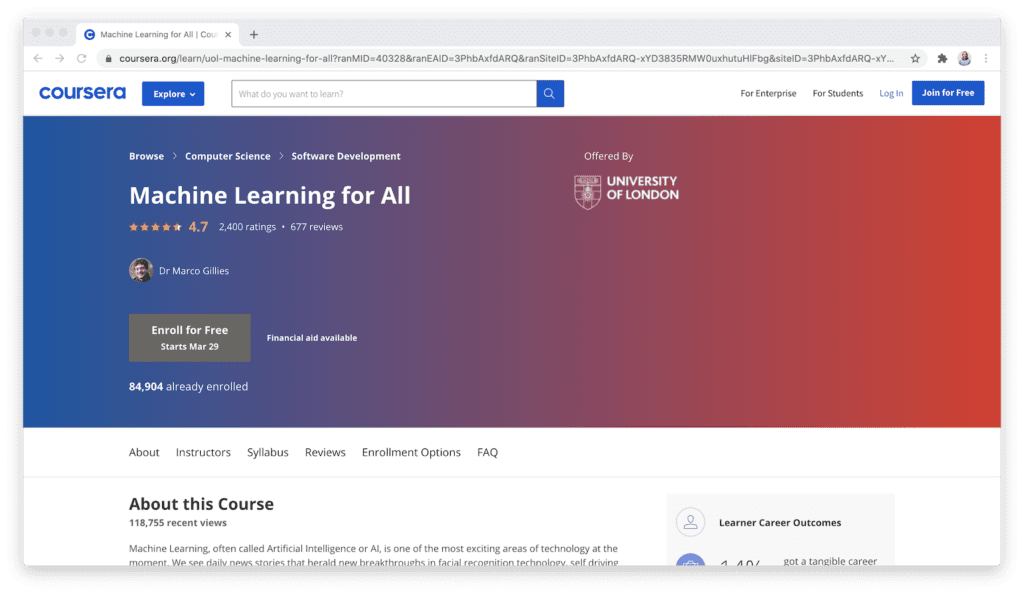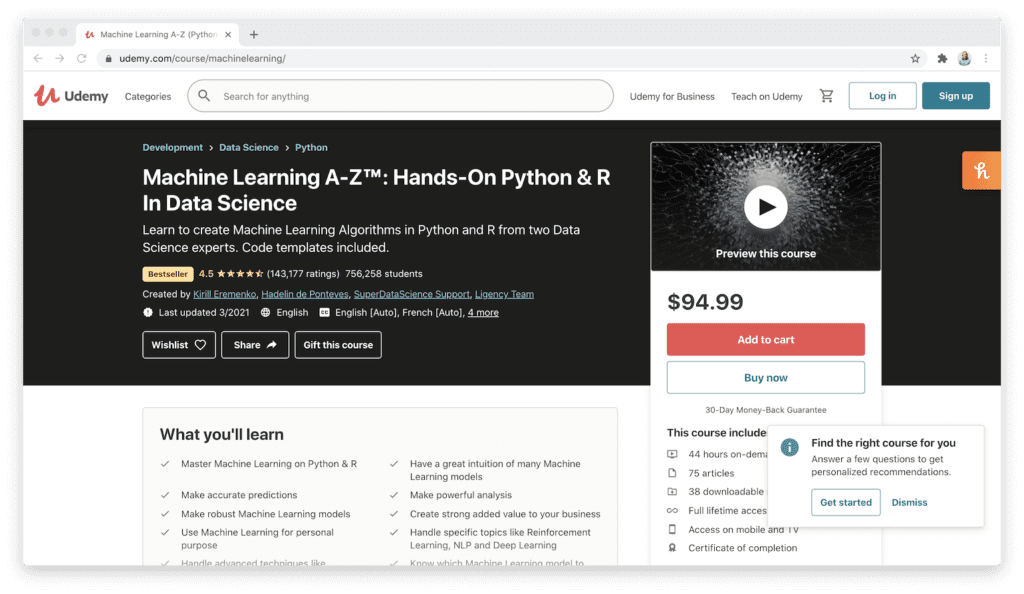All Categories
Featured
Table of Contents
- – Facts About Machine Learning Certification Tra...
- – Machine Learning Crash Course For Beginners Th...
- – Best Online Machine Learning Courses And Prog...
- – Generative Ai Training Things To Know Before ...
- – 10 Simple Techniques For Generative Ai Training
- – Little Known Questions About How To Become A...
- – Ai And Machine Learning Courses Fundamentals...
Some individuals assume that that's dishonesty. If somebody else did it, I'm going to use what that individual did. I'm requiring myself to believe through the feasible options.
Dig a little deeper in the mathematics at the start, so I can construct that foundation. Santiago: Ultimately, lesson number seven. This is a quote. It claims "You need to comprehend every information of a formula if you intend to use it." And afterwards I say, "I assume this is bullshit guidance." I do not believe that you have to comprehend the nuts and screws of every algorithm prior to you utilize it.
I would have to go and check back to actually obtain a much better intuition. That doesn't indicate that I can not solve points making use of neural networks? It goes back to our sorting example I assume that's just bullshit advice.
As an engineer, I've serviced many, numerous systems and I've used many, numerous things that I do not recognize the nuts and screws of just how it functions, despite the fact that I comprehend the effect that they have. That's the last lesson on that particular thread. Alexey: The amusing point is when I believe about all these collections like Scikit-Learn the algorithms they make use of inside to execute, as an example, logistic regression or something else, are not the same as the algorithms we study in equipment discovering classes.
Facts About Machine Learning Certification Training [Best Ml Course] Uncovered
Even if we attempted to learn to obtain all these fundamentals of equipment understanding, at the end, the algorithms that these libraries use are different. Right? (30:22) Santiago: Yeah, definitely. I believe we require a whole lot a lot more materialism in the market. Make a whole lot more of an impact. Or concentrating on providing value and a bit much less of purism.

I usually speak to those that want to function in the sector that want to have their impact there. I do not risk to talk regarding that since I do not understand.
Right there outside, in the sector, materialism goes a long means for certain. Santiago: There you go, yeah. Alexey: It is an excellent inspirational speech.
Machine Learning Crash Course For Beginners Things To Know Before You Buy
One of the things I desired to ask you. First, allow's cover a pair of things. Alexey: Let's begin with core tools and structures that you need to discover to in fact transition.
I know Java. I understand how to use Git. Maybe I know Docker.
Santiago: Yeah, absolutely. I think, number one, you should begin learning a little bit of Python. Since you already understand Java, I don't believe it's going to be a big transition for you.
Not since Python coincides as Java, however in a week, you're gon na get a great deal of the distinctions there. You're gon na be able to make some development. That's top. (33:47) Santiago: Then you get specific core tools that are going to be made use of throughout your whole occupation.
Best Online Machine Learning Courses And Programs for Beginners
That's a library on Pandas for information control. And Matplotlib and Seaborn and Plotly. Those three, or one of those three, for charting and presenting graphics. You get SciKit Learn for the collection of maker understanding formulas. Those are devices that you're going to have to be utilizing. I do not recommend just going and learning about them out of the blue.
Take one of those programs that are going to begin presenting you to some issues and to some core ideas of equipment learning. I don't bear in mind the name, but if you go to Kaggle, they have tutorials there for complimentary.
What's good about it is that the only requirement for you is to understand Python. They're mosting likely to provide an issue and inform you how to make use of decision trees to solve that details issue. I assume that process is exceptionally powerful, because you go from no device finding out history, to comprehending what the problem is and why you can not resolve it with what you know now, which is straight software program design techniques.
Generative Ai Training Things To Know Before You Get This
On the various other hand, ML engineers focus on building and deploying machine discovering versions. They concentrate on training models with data to make forecasts or automate jobs. While there is overlap, AI engineers manage even more diverse AI applications, while ML engineers have a narrower emphasis on artificial intelligence formulas and their sensible execution.

Artificial intelligence designers concentrate on developing and releasing artificial intelligence designs into manufacturing systems. They function on design, making sure versions are scalable, efficient, and integrated right into applications. On the other hand, data researchers have a more comprehensive function that includes data collection, cleaning, exploration, and structure designs. They are usually in charge of extracting insights and making data-driven decisions.
As organizations significantly embrace AI and artificial intelligence technologies, the need for competent experts expands. Equipment discovering designers work on sophisticated jobs, add to development, and have competitive salaries. Nonetheless, success in this field calls for constant understanding and maintaining up with progressing innovations and strategies. Artificial intelligence roles are typically well-paid, with the capacity for high gaining potential.
ML is basically different from traditional software advancement as it concentrates on training computer systems to gain from information, as opposed to shows specific policies that are implemented methodically. Uncertainty of end results: You are probably made use of to creating code with predictable results, whether your feature runs when or a thousand times. In ML, nevertheless, the outcomes are much less specific.

Pre-training and fine-tuning: How these designs are trained on large datasets and then fine-tuned for specific tasks. Applications of LLMs: Such as text generation, view evaluation and information search and retrieval.
10 Simple Techniques For Generative Ai Training
The capability to manage codebases, combine adjustments, and resolve disputes is equally as important in ML advancement as it is in typical software application projects. The skills developed in debugging and screening software application applications are extremely transferable. While the context may alter from debugging application reasoning to identifying issues in information processing or version training the underlying principles of methodical investigation, theory screening, and iterative improvement coincide.
Equipment understanding, at its core, is heavily dependent on statistics and probability concept. These are critical for understanding how algorithms learn from information, make forecasts, and assess their efficiency.
For those curious about LLMs, a complete understanding of deep discovering designs is beneficial. This includes not only the auto mechanics of neural networks however additionally the style of certain designs for various usage cases, like CNNs (Convolutional Neural Networks) for picture handling and RNNs (Frequent Neural Networks) and transformers for sequential data and natural language handling.
You must know these issues and discover techniques for identifying, mitigating, and connecting concerning prejudice in ML versions. This consists of the possible impact of automated decisions and the moral implications. Many versions, specifically LLMs, require significant computational sources that are commonly supplied by cloud systems like AWS, Google Cloud, and Azure.
Building these skills will not just facilitate an effective shift right into ML yet likewise guarantee that developers can add properly and responsibly to the advancement of this vibrant field. Concept is crucial, yet nothing defeats hands-on experience. Start servicing tasks that enable you to use what you've discovered in a practical context.
Construct your projects: Start with straightforward applications, such as a chatbot or a text summarization device, and progressively boost intricacy. The area of ML and LLMs is rapidly developing, with new breakthroughs and modern technologies emerging routinely.
Little Known Questions About How To Become A Machine Learning Engineer - Uc Riverside.
Contribute to open-source jobs or write blog site articles concerning your discovering journey and tasks. As you acquire proficiency, start looking for possibilities to include ML and LLMs right into your job, or seek brand-new roles focused on these technologies.

Possible usage situations in interactive software, such as referral systems and automated decision-making. Understanding uncertainty, standard analytical steps, and likelihood circulations. Vectors, matrices, and their duty in ML formulas. Error minimization techniques and slope descent discussed merely. Terms like version, dataset, features, labels, training, reasoning, and recognition. Data collection, preprocessing methods, design training, evaluation procedures, and deployment considerations.
Choice Trees and Random Forests: User-friendly and interpretable designs. Support Vector Machines: Maximum margin classification. Matching trouble types with suitable models. Balancing performance and complexity. Fundamental framework of neural networks: nerve cells, layers, activation functions. Split computation and forward propagation. Feedforward Networks, Convolutional Neural Networks (CNNs), Recurring Neural Networks (RNNs). Photo recognition, sequence forecast, and time-series evaluation.
Information flow, change, and function engineering strategies. Scalability concepts and efficiency optimization. API-driven approaches and microservices integration. Latency management, scalability, and version control. Constant Integration/Continuous Implementation (CI/CD) for ML process. Version tracking, versioning, and performance monitoring. Discovering and resolving changes in version performance gradually. Dealing with efficiency traffic jams and resource management.
Ai And Machine Learning Courses Fundamentals Explained

Course OverviewMachine understanding is the future for the following generation of software professionals. This training course acts as a guide to equipment learning for software program designers. You'll be introduced to three of one of the most relevant elements of the AI/ML self-control; managed discovering, semantic networks, and deep discovering. You'll comprehend the differences in between traditional programming and artificial intelligence by hands-on development in monitored knowing before developing out complex distributed applications with semantic networks.
This program acts as a guide to equipment lear ... Program More.
Table of Contents
- – Facts About Machine Learning Certification Tra...
- – Machine Learning Crash Course For Beginners Th...
- – Best Online Machine Learning Courses And Prog...
- – Generative Ai Training Things To Know Before ...
- – 10 Simple Techniques For Generative Ai Training
- – Little Known Questions About How To Become A...
- – Ai And Machine Learning Courses Fundamentals...
Latest Posts
What Faang Companies Look For In Data Engineering Candidates
Best Leetcode Problems To Practice For Faang Interviews
10 Mistakes To Avoid In A Software Engineering Interview
More
Latest Posts
What Faang Companies Look For In Data Engineering Candidates
Best Leetcode Problems To Practice For Faang Interviews
10 Mistakes To Avoid In A Software Engineering Interview